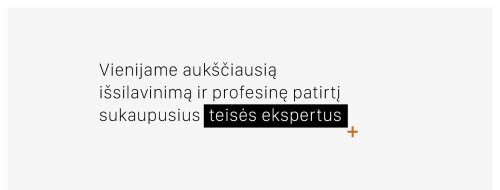Best Arrests & Searches Lawyers in Kaunas
Share your needs with us, get contacted by law firms.
Free. Takes 2 min.
List of the best lawyers in Kaunas, Republic of Lithuania
About Arrests & Searches Law in Kaunas, Republic of Lithuania
Arrests and searches in Kaunas, as in the rest of Lithuania, are governed by national laws designed to protect individual rights while enabling law enforcement to maintain public safety. These laws set out clear procedures for when and how a person can be arrested or searched. The Lithuanian Constitution, the Code of Criminal Procedure, and related legal acts form the framework that regulates the conduct of police officers and other authorities during these processes. In recent years, Lithuania has aligned its procedures with European Union standards to ensure the protection of human rights during arrests and searches.
Why You May Need a Lawyer
Facing an arrest or search can be a stressful and confusing experience, especially if you are unfamiliar with your rights. You may need a lawyer for several reasons, including:
- Help understanding your rights during a police investigation
- Legal representation if you have been arrested or detained
- Assistance if your property has been searched or seized
- Ensuring law enforcement followed proper legal procedures
- Filing complaints about unlawful arrests or searches
- Advising you on legal remedies or compensation claims
- Defending you against criminal charges arising from an arrest
- Protecting your personal and professional reputation
A lawyer can ensure your rights are respected, explain the legal process in simple terms, and help you make informed decisions following an arrest or search.
Local Laws Overview
Several key laws and regulations dictate how arrests and searches are carried out in Kaunas, Republic of Lithuania:
- Only authorized law enforcement officers may carry out arrests or searches, and they must present identification on request.
- Arrests must be based on reasonable suspicion of a crime and must be authorized by the courts, except in urgent situations defined by law.
- Searches of homes, offices, or vehicles usually require a court-issued warrant, except in cases where immediate action is needed to prevent a crime or evidence destruction.
- You have the right to be informed of the reason for your arrest or search and the right to remain silent.
- If you are detained, you have the right to a lawyer and to inform a relative or person of your choosing about your detention.
- Any evidence obtained in violation of legal procedures may not be admissible in court.
- The police must provide you with a record of the search or arrest detailing the actions taken and your rights.
These rules aim to balance effective law enforcement with the protection of fundamental human rights.
Frequently Asked Questions
What should I do if I am arrested in Kaunas?
Stay calm, comply with police instructions, and request to see their identification. Ask for a lawyer immediately and do not answer questions until your lawyer is present.
Do I need to allow police to search my home without a warrant?
Generally, police need a warrant to search your home. There are limited exceptions, such as imminent threats or ongoing crimes. Always ask to see the warrant and check its details.
What rights do I have during a police search?
You have the right to see the search warrant, to have witnesses present if possible, and to receive a list of items seized. You also have the right to consult a lawyer during the process.
Can I be held by police without being charged?
Yes, but only for a limited time. In most cases, you may be detained up to 48 hours without formal charges. After this, a court must decide whether to continue your detention.
Is it legal for police to search my vehicle?
Police can search your vehicle if they have reasonable grounds to believe it contains evidence of a crime or if you consent. A warrant is not always necessary for vehicle searches.
What if I believe my arrest or search was unlawful?
Contact a lawyer immediately. You may file a complaint with the police, the prosecutor’s office, or seek legal remedies through the courts for violations of your rights.
Must I answer police questions if I am a suspect?
No, you have the right to remain silent and may refuse to answer incriminating questions until you speak with a lawyer.
Will I be informed of my rights when arrested?
Yes, the police are required to inform you of your rights, including the right to a lawyer and the right to remain silent, when you are arrested or detained.
Are there special protections for minors during arrest or search?
Yes, minors have additional protections, including the right to have a parent or legal representative present and special questioning procedures.
Can evidence taken during an illegal search be used against me?
Evidence obtained unlawfully may be excluded from court proceedings, but this is determined by the court based on the circumstances of the case.
Additional Resources
Several organizations and governmental bodies can offer support and information related to arrests and searches in Kaunas:
- State Guaranteed Legal Aid Service (Valstybės garantuojamos teisinės pagalbos tarnyba) – offers free or subsidized legal assistance for eligible individuals
- Lithuanian Bar Association (Lietuvos advokatūra) – provides a directory of licensed lawyers
- Kaunas Police Headquarters (Kauno apskrities vyriausiasis policijos komisariatas) – local police contact and complaints office
- Lithuanian Ombudsman’s Office (Lygybės kontrolieriaus įstaiga) – investigates complaints about violations of rights by public authorities
- Lithuanian Human Rights Centre – offers information and advocacy regarding human rights violations
Next Steps
If you or someone you know is facing issues related to arrests or searches in Kaunas, take the following steps:
- Record all details of the situation, including the names of officers, time, and place
- Request to see warrants or authorization documents for searches or arrests
- Contact a qualified criminal defense lawyer as soon as possible
- Do not make statements or sign documents without your lawyer’s guidance
- File complaints with the appropriate authority if you believe your rights were violated
- Reach out to organizations listed above for further assistance and support
Taking swift and informed action after an arrest or search will help protect your rights and ensure the best possible outcome. A local lawyer with experience in arrests and searches can provide the expert guidance you need at every stage.
Lawzana helps you find the best lawyers and law firms in Kaunas through a curated and pre-screened list of qualified legal professionals. Our platform offers rankings and detailed profiles of attorneys and law firms, allowing you to compare based on practice areas, including Arrests & Searches, experience, and client feedback.
Each profile includes a description of the firm's areas of practice, client reviews, team members and partners, year of establishment, spoken languages, office locations, contact information, social media presence, and any published articles or resources. Most firms on our platform speak English and are experienced in both local and international legal matters.
Get a quote from top-rated law firms in Kaunas, Republic of Lithuania — quickly, securely, and without unnecessary hassle.
Disclaimer:
The information provided on this page is for general informational purposes only and does not constitute legal advice. While we strive to ensure the accuracy and relevance of the content, legal information may change over time, and interpretations of the law can vary. You should always consult with a qualified legal professional for advice specific to your situation.
We disclaim all liability for actions taken or not taken based on the content of this page. If you believe any information is incorrect or outdated, please contact us, and we will review and update it where appropriate.















